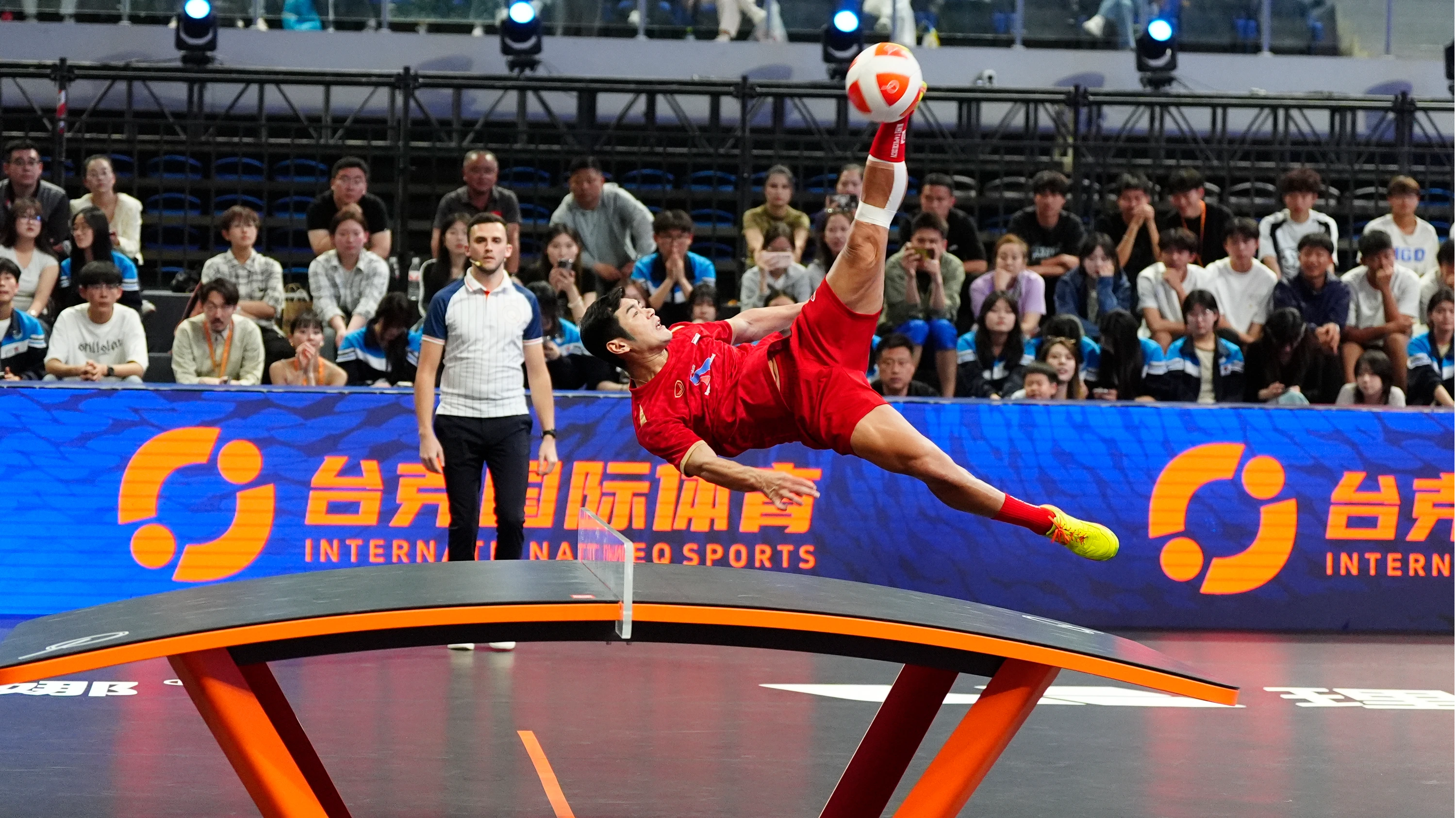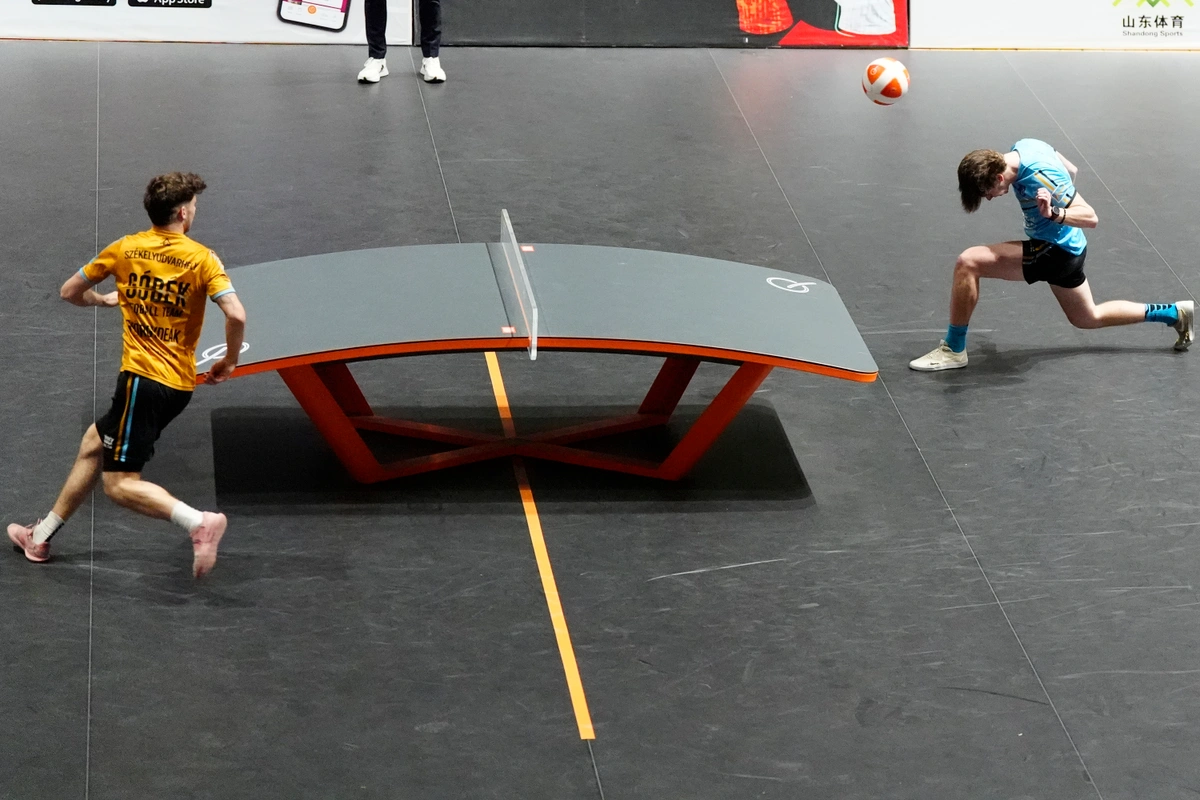
The four champions stood out statistically in Jinan
Across three days of action, 74 athletes from 18 nations battled through 157 matches in women’s & men’s singles, and mixed doubles. Each category produced its share of brilliance, but the bigger picture was clear – Teqball is deepening, tightening, and evolving fast.
The field arrived prepared including more than 30 newcomers from China. The margins were small and by the end, four names stood apart from the rest.
Apor Gyorgydeak (ROU), still unbeaten in men’s singles since the start of last season, extended his flawless streak with another campaign of calm precision and ruthless smashes and reached his 69th consecutive triumph. Jutatip Kuntatong (THA), the reigning world champion in women’s singles, brought poise and pressure to every point, navigating her matches with minimal fuss and maximum control. And in the mixed doubles draw, the ever-reliable, back-to-back world champion Thai pairing of Suphawadi Wongkhamchan and Phakpong Dejaroen reasserted their status with a perfect record, built on interchangeability of roles, crisp footwork, and defensive discipline.
Together, these four did not just win matches. They defined the rhythm of the tournament. Their numbers backed it up – and so did the eye test.
From a performance standpoint, the statistics underscored the class at the top. Marek Pokwap (POL), still only 19 years of age, won a tournament-high 313 points across 12 matches. He reached the men’s singles semi-finals and claimed silver in mixed doubles alongside Moldovan partner Viorica Tonu – a duo that surprised several more experienced teams along the way.
But if total output impressed, it was efficiency that truly signalled dominance. Gyorgydeak ended his campaign with a staggering +171 point differential – despite scoring just two points fewer than Pokwap overall. It was not about volume. It was about control. The 'Queen of Teqball', Jutatip Kuntatong came second with +135 point difference, while Adam Blazsovics (HUN) achieved third with an impressive score of +129.
And while attack tends to take the spotlight, it was defence that separated the great from the good. Adam Blazsovics, the four-time world champion, led the field with just 10.00 points allowed per game. Steady, composed, and rarely rushed, his structure forced opponents to take risks they could not afford. Just behind him was Kuntatong, conceding only 10.91 points across her 11-match run – another reminder that at this level, defending well is just as decisive as attacking with flair.
Mixed doubles brought its own kind of dominance. Wongkhamchan and Dejaroen went unbeaten through six matches, posting a +74 point differential and keeping every match within their tempo. Their ability to dictate the pace and reset under pressure made them nearly impossible to break down.
But it was not just the podium finishes that told the story. Jinan’s real theme was consistency – and the fact that nobody went unbeaten in either first or second sets throughout the tournament said a great deal about the depth of the field. Every match demanded more.
Gyorgydeak came close, averaging 11.92 points in opening sets. Just behind him was European champion Kinga Barabasi, who averaged 11.89. Pokwap, whose campaign included four three-set matches, starred in the tournament’s most dramatic showdown: a 17–15 deciding set, which went the way of the Gyorgydeak / Barabasi pairing in a high-stakes mixed doubles clash. The match registered the highest score on DATATEQ’s new match quality index.
Workload was another factor. Pokwap, Gyorgydeak, and Wongkhamchan each played 12 matches in three days – a figure that tested not only their technique but also their endurance. Blazsovics and Kuntatong were not far behind on 11, showing that in modern Teqball, sustained output is becoming a hallmark of the elite.
In the end, the Jinan leg of the World Series delivered more than just results. It confirmed that the sport is maturing. Rallies were longer. Set scores were tighter. And the tactical variety on display showed that Teqball’s top players are not just quick with their feet – they are thinking faster too.
The Jinan event marked another step forward for the host nation, as 28 Chinese players continued to build their presence on the international stage. Among them, Hu Hong Shi stood out by playing six matches in total, having advanced from both the women’s singles and mixed doubles group stages. She recorded 83 points across her campaign – a strong showing that reflected both commitment and promise. It was another clear sign of Teqball’s ongoing expansion, with China becoming an increasingly active part of the sport’s global landscape.
Jinan was a reminder of how far Teqball has come – and how far it is ready to go. The game’s best did not just win. They adapted, endured, and outperformed in the small margins where modern Teqball lives.
The next stop on the Teqball World Series will take place in Dezhou from 23rd to 25th May, where the momentum from Jinan is sure to carry into another high-stakes showdown.
